Exotic Pet Birds: A Guide for New York Enthusiasts
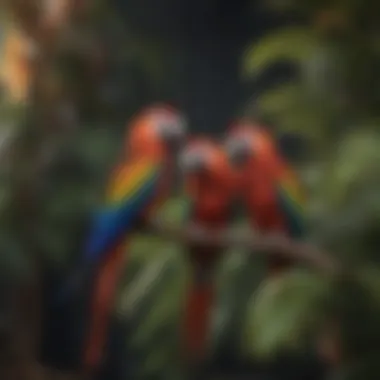
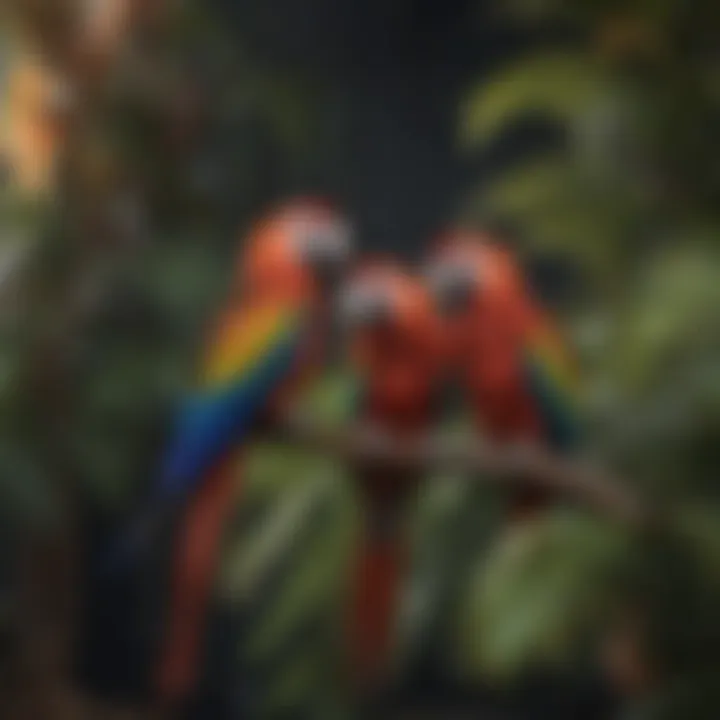
Intro
Exotic pet birds have become increasingly popular in urban settings like New York City. Their vibrant colors, unique calls, and fascinating behaviors provide joy and companionship to many households. As more enthusiasts consider adding these birds to their lives, an understanding of their care and requirements becomes essential. This article offers insights into the types of exotic birds available, the responsibilities of ownership, and the ethical considerations that come with it.
Moreover, it addresses the legal aspects of keeping these birds within the state, ensuring potential owners navigate the regulations successfully. Whether you are a first-time bird parent or a seasoned aficionado, enhancing your knowledge about avian care is crucial for responsible ownership.
Care Tips
Caring for an exotic bird requires more than just providing food and water. Daily routines, cage setups, and specific health practices are fundamental to ensuring a happy and healthy bird.
Daily Care Routines
Daily routines involve feeding, socializing, and monitoring your bird's behavior. Birds thrive on structure. Therefore, try to establish a consistent schedule for feeding and playtime. Observe your bird closely to note their mood and any changes in behavior. These can indicate health issues or environmental stressors.
Cage Setup and Maintenance
A suitable cage is vital for the well-being of your bird. The size and features of the cage should depend on the species you choose. For example, larger birds like cockatoos need spacious cages, while smaller birds like budgerigars can thrive in more compact environments. Ensure the cage is stocked with perches of varying sizes, toys, and places for your bird to hide and explore. A clean environment is crucial, so ensure you regularly change the bedding and remove any waste.
Hygiene and Cleaning Practices
Maintaining hygiene is paramount in bird care. Regularly schedule cleaning sessions, ideally once a week, to maintain a clean habitat. Wash food and water dishes daily to prevent bacterial growth. Use safe, non-toxic cleaning materials to avoid harm to your bird.
Seasonal Care Adjustments
Birds may require different care depending on the season. In colder months, ensure the cage is positioned away from drafts. Consider adding heat sources or covers to keep them warm. During warmer months, ensure they do not overheat, and provide plenty of water and shade.
Behavioral Insights
Understanding a bird's behavior can significantly enhance the owner-pet bond. Many birds communicate their feelings through their body language.
Understanding Bird Body Language
Birds express their feelings through various postures and movements. For instance, a bird with a relaxed posture is likely feeling comfortable, while feather fluffing can indicate stress. Be attentive to your bird's signals.
Common Behavioral Issues and Solutions
Common issues include excessive screeching, biting, or feather-picking. These behaviors often signal boredom or discomfort. Offering varied toys and stimulating activities can help mitigate these problems.
Positive Reinforcement Techniques
Use positive reinforcement to encourage desirable behaviors. This could involve treats or praise when your bird performs a trick or behaves well. Positive interaction nurtures trust and reduces fear.
Social Interaction Needs
Birds are naturally social animals. Regular interaction with their human companions or other birds is critical for their mental health. Schedule time to engage with your pet daily, incorporating play and training.
Nutrition Guides
Feeding your exotic bird a balanced diet is key to their well-being.
Essential Diet Components
A well-rounded diet includes seeds, pellets, fruits, and vegetables. Each species has unique dietary needs. Research the specific requirements of your bird’s species for optimal health.
Safe and Toxic Foods
Not all foods are safe for birds. Familiarize yourself with toxic items, such as avocado and chocolate, to protect your bird from harm. Offering a varied diet will keep mealtime interesting.
Supplements and Treats
Consider offering nutritional supplements if your bird's diet lacks key components. Natural treats, like nuts or dried fruits, can be indulgent rewards but should be given in moderation.
Feeding Strategies for Different Species
Different birds have various feeding strategies. For example, smaller birds may prefer free-feeding, while larger birds might need measured amounts at specific intervals. Adjust feeding based on activity levels and health.
Wellness and Health
Maintaining your bird's health is a priority for any owner.
Routine Health Checkups
Schedule regular veterinary checkups to monitor your bird’s health. These should include beak, feather, and weight examinations and advice on care.
Identifying Symptoms of Illness
Learn to recognize concerning symptoms, such as changes in appetite, lethargy, or behavioral shifts. Early detection of illness can lead to successful treatment.
Preventative Care and Vaccinations
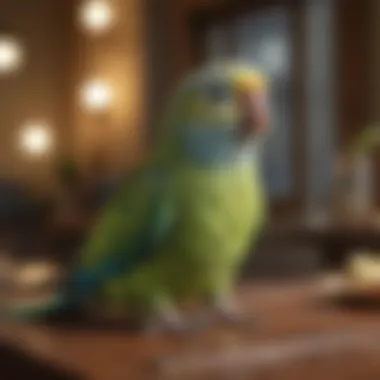
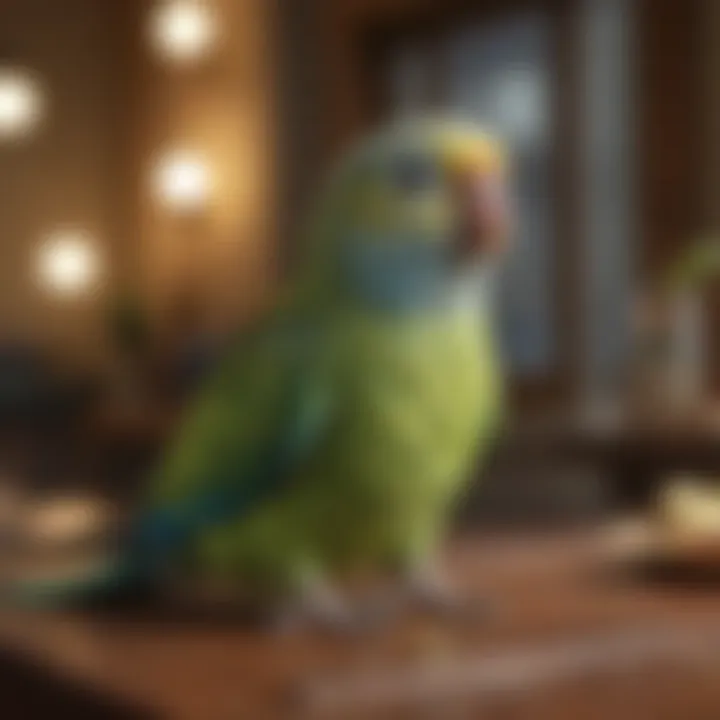
Preventative care, including vaccinations, is essential for your bird. Discuss necessary vaccinations specific to your bird's species with your veterinarian.
Mental and Emotional Well-being
A happy bird is a healthy bird. Provide activities that engage their minds for improved emotional health. Using puzzles or simple tricks can enhance your bond while keeping your bird mentally stimulated.
Enriching Activities
Engaging your bird through various enriching activities is essential for its overall well-being.
Toys and Playtime Ideas
Rotate toys to keep your bird's environment stimulating. Toys should be safe and allow for mental engagement.
Training and Tricks
Training offers mental stimulation and can strengthen your relationship. Teach simple commands using patience and consistency.
Outdoor Activities and Interaction
Depending on your bird’s species, outdoor time can be beneficial. Make sure to use safe harnesses or secure cages during outdoor interactions.
DIY Projects for Mental Stimulation
Create engaging DIY projects for your bird. Items like foraging toys or puzzles made from cardboard can provide endless hours of entertainment.
"Owning an exotic bird is a lifelong commitment that requires careful consideration and preparation."
Prelude to Exotic Pet Birds
The world of exotic pet birds is vast and intriguing. As we begin to explore this topic, we must understand how exotic birds fit into the so-called pet ecosystem. Exotic birds have unique traits, requiring specific care and understanding. Bird enthusiasts often find joy in their companionship, vibrant personalities, and remarkable intelligence. This section serves as an introduction to the core ideas behind owning exotic pet birds, especially in the diverse environment of New York.
Definition of Exotic Bird Species
Exotic birds are those species not native to a particular region. Many of these birds are sought after for their beauty and companionship. This categorization often includes a variety of species such as Macaws, Cockatoos, and African Grey Parrots. Each species has its own unique characteristics and care requirements. Understanding what makes a bird exotic is crucial for potential owners. By recognizing these traits, one can ensure a suitable match between bird and owner.
Popularity of Exotic Birds in New York
New York is a hub for exotic bird enthusiasts, and this popularity continues to grow. With its vibrant culture and diverse population, the city provides ample opportunities for bird owners to connect. The increase in awareness about bird care has contributed to their growing presence in households. According to various sources, many people find themselves attracted to the idea of having an exotic pet bird due to their stunning colors and engaging behaviors. The demand for these birds influences their availability in pet stores and breeding establishments.
In New York, social media plays a role in promoting exotic bird ownership. Groups on platforms like Reddit and Facebook bring together bird owners and enthusiasts alike. These networks provide an avenue to share experiences, offer advice, and showcase their beloved companions. Thus, the fascination with exotic birds is not merely a trend; it reflects a deeper appreciation for their beauty and the bond they form with their owners.
"Owning an exotic pet bird is not just about feeding them or keeping them in a cage; it is about understanding their needs and nurturing their personalities."
Common Exotic Bird Species in New York
Understanding the various exotic bird species available in New York is essential for current and prospective owners. It highlights the diversity within avian companionship and underscores the importance of responsible ownership. Each species has its unique traits and requirements, influencing the potential owner's choice.
Bird enthusiasts can benefit from knowing not only the characteristics and demands of these birds but also their suitability for different living situations. This knowledge serves as a foundation for healthy relationships between birds and their owners, fostering mutual respect and care.
Cockatoos
Cockatoos are striking birds known for their impressive crests and affectionate nature. They often bond closely with their owners, often seeking attention and interaction. These birds require plenty of social stimulation. As a result, potential owners must understand their need for companionship. Cockatoos can live for over 50 years, making them a long-term commitment.
They thrive in spacious environments with appropriate toys and enrichment activities. Their vocalizations can range from charming to loud, which may challenge those in shared living spaces. Cockatoos generally require a diet rich in fruits, vegetables, and nuts.
Macaws
Macaws are among the largest and most colorful pet birds. They are admired for their intelligence and playful behavior. This energy necessitates a significant amount of engagement and mental stimulation. Owners need to be dedicated to providing diverse activities to keep macaws stimulated. They are also known for their strong beaks, which can cause damage if not properly managed.
A proper diet must include seeds, pellets, and fresh food. Because of their size and dietary needs, macaws require larger cages and more extensive care compared to smaller species. Their lifespan can reach 50 years or more, which is significant for any potential owner to consider.
Parrots
Parrots, in general, represent a vast array of species, including popular types like African Grey, Amazon, and Budgerigar. They are highly sociable and can mimic human speech, making them engaging companions. Parrots require routine social interaction to thrive. Poor socialization can lead to behavioral issues, such as feather plucking.
Their diet is similar to that of macaws, necessitating high-quality pellets and fresh fruits. Parrots also need a secure and spacious environment that allows for movement and play. Many parrot species are known for their intelligence and problem-solving abilities, which owners must foster through interaction and enrichment.
Finches
Finches are smaller birds that are ideal for those looking for a quieter option. Their charming, gentle nature and cheerful chirping make them popular among bird enthusiasts. They thrive in groups and should ideally be kept in pairs or small flocks. Unlike some larger species, finches do not typically require extensive handling or social interaction with humans.
Their diet consists of seeds, fruits, and vegetables, which must be balanced for their health. Finches require adequate cage space, with plenty of perches and safe toys. Regular maintenance of their living environment is crucial for their overall health and happiness.
"Choosing the right exotic bird species is fundamental to ensuring a rewarding experience for both the owner and the bird. Each species comes with its own set of needs that must be met."
Legal Considerations for Bird Ownership
Understanding the legal framework surrounding exotic bird ownership is critical for both current and prospective bird owners. The regulations help protect both the birds themselves and potential owners from unintended legal consequences. With specific laws and guidelines in place, it becomes easier to navigate the complexities of keeping exotic birds as pets. This section will delve into federal regulations and state laws specific to New York, highlighting essential points that every bird owner should be aware of.
Federal Regulations on Exotic Birds
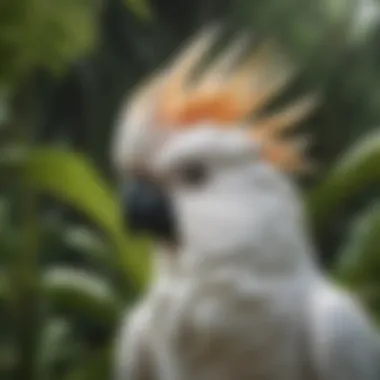
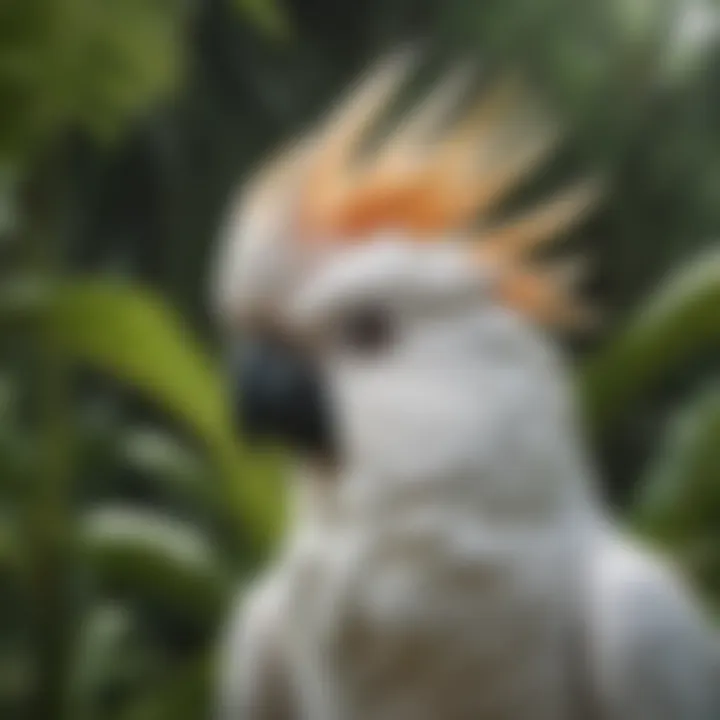
The U.S. federal government has outlined various regulations designed to safeguard exotic bird species. The primary legislation affecting bird ownership includes the Migratory Bird Treaty Act and the Endangered Species Act. These regulations restrict the capture and trade of certain species, ensuring that wild populations are not adversely impacted.
- Migratory Bird Treaty Act: This law protects migratory birds by prohibiting their hunting, capturing, or selling without a permit. Most exotic bird species do not fall under this act, but it’s essential to check if any birds you wish to keep are classified as migratory.
- Endangered Species Act: This act is crucial for protecting threatened and endangered species. It is illegal to possess, sell, or transport birds listed under this act. Owners must be aware of these classifications to avoid legal issues.
Failure to comply with federal regulations can result in heavy fines or other penalties. Therefore, bird owners must ensure they are informed and adhere to these laws when acquiring exotic birds.
State Laws Governing Bird Ownership in New York
In addition to federal mandates, each state implements its own regulations regarding exotic pet ownership. In New York, specific state laws govern the keeping of exotic birds. Many of these laws are aimed at preserving wildlife and ensuring the humane treatment of pets.
- Prohibition of Certain Species: Some birds are banned from being owned as pets. For example, species deemed invasive may not be kept or sold. It is vital to research which birds are permitted before considering acquisition.
- Permitting Requirements: In some cases, a special permit may be required to keep specific species. This requirement aims to ensure that owners have the necessary knowledge and resources to provide appropriate care.
- Animal Welfare Laws: New York has laws stipulating proper care standards for pets, including exotic birds. Failure to provide sufficient care can lead to legal repercussions.
Bird ownership is a significant responsibility. Understanding and complying with both federal and state laws protects you and the birds you care for.
In summary, navigating the legal landscape of bird ownership in New York involves understanding federal regulations and state laws. Understanding these legal frameworks will not only help you avoid potential penalties but also ensure the welfare and sustainability of exotic bird species. As an aspiring or existing bird owner, taking the time to be well-versed in these regulations is essential for responsible and ethical ownership.
The Economics of Owning Exotic Birds
Owning an exotic bird can be a rewarding experience, but it also comes with significant financial responsibilities. Understanding the economics behind bird ownership is crucial for potential owners. The initial purchase price is just the beginning; ongoing costs for maintenance, care, and veterinary services quickly add up. This section will dissect these financial aspects, offering insights into what prospective owners should consider before bringing an exotic bird into their home.
Initial Purchase Price of Exotic Birds
The initial purchase price of an exotic pet bird varies significantly based on several factors. Species, rarity, age, and breeder reputation play pivotal roles in determining cost. For instance, you can expect to pay anywhere from a few hundred to several thousand dollars for species like African Grey Parrots or Hyacinth Macaws.
Common birds, such as Budgerigars, may cost under a hundred dollars, whereas rarer birds like Cobalt Macaws have a much higher starting point. Furthermore, many birds from reputable breeders often come with a cost premium due to their health guarantees and proper socialization.
An important consideration is the potential for unforeseen expenses right from the start. Initial costs may also include items like cages, food, toys, and other supplies that contribute to a proper setup for the bird's comfort and health.
Ongoing Care Costs
Ongoing care costs can create a significant financial commitment for bird owners. Food expenses vary based on species and dietary needs. Specialty diets may cost more, often ranging from $20 to over $100 a month.
Birds require toys and interaction to stay mentally stimulated. Regularly purchasing or crafting new toys can add another $10 to $50 per month. Cage cleaning supplies are also essential, contributing to ongoing costs.
Moreover, birds need a proper habitat, which may require bedding and other cage accessories. Over time, these expenses accumulate, making long-term budgeting essential for potential bird owners. They must also factor in the time dedication needed for companionship and daily interaction.
Cost of Veterinary Care
Veterinary care is a critical component of exotic bird ownership. Birds are prone to specific health issues, requiring specialized avian vets. Routine check-ups can range from $50 to $150 or more, depending on the avian vet's experience and the services provided.
In cases of illness or emergencies, the costs can escalate. Procedures may run anywhere from a few hundred to thousands of dollars. Some owners opt for pet insurance, but it's crucial to research and understand what is covered.
"Before acquiring an exotic bird, prospective owners must prepare financially for both routine and unexpected veterinary care."
Enrichment and Care Requirements for Exotic Birds
Exotic birds, like any pets, require specific care and joy-filled environments to thrive. The term "enrichment" refers to activities and settings that stimulate a bird's natural behaviors. It is crucial for their psychological health and overall well-being. Owners must understand these requirements to ensure their birds are not just living but flourishing. When owners provide the right care, it fosters a bond and curtails common behavioral problems, making them happier companions.
Dietary Needs of Exotic Birds
Dietary needs vary among exotic bird species. Understanding what to feed your bird is essential. A varied diet typically includes high-quality pellets, fresh fruits, vegetables, and occasional seeds. Each species may have specific nutrition requirements. For example, macaws often require more fat in their diet due to their larger size, while budgies need a higher percentage of seeds.
- High-Quality Pellets: These provide balanced nutrition.
- Fresh Fruits: These are great for hydration and vitamins. Offer items like apples, pears, and bananas.
- Vegetables: Leafy greens, carrots, and peppers should be a routine part of their diet.
- Occasional Seeds: These are seen as treats and should not make up the primary diet.
Owner should consult an avian veterinarian to tailor their bird's diet. Proper nutrition is an ongoing comprehension and adoption that results in long and healthy lives.
Habitat and Cage Setup
Creating the right habitat is vital for an exotic bird's comfort and well-being. Birds spend a significant amount of their time in their cages, thus, it’s critical that this space is designed while considering their needs.
Cage Size: The cage must be spacious enough. Birds enjoy moving and flying, therefore, larger cages enable them to stretch their wings.
Perches: Utilize a variety of perch sizes and materials. This helps to promote foot health and offers a change during their day.
Toys: Incorporate both chewable and stimulating toys. This encourages play and reduces boredom. Frequent changes ensure ongoing stimulation.
Cleanliness: Maintain hygiene within the cage. Regular cleaning helps to avoid health issues.
In short, an adequately designed habitat minimizes stress and ensures happiness.
Socialization and Interaction Necessities
Birds are social creatures. They thrive on interaction, both with their owners and other birds. Socialization is not just about playtime; it’s an essential part of their upbringing.
- Daily Interaction: Spend time with your bird every day.
- Out of Cage Time: Allow them to explore outside their cage a few times a week. This expands their environment and gives them room to exercise.
- Training Sessions: Engaging in training provides mental stimulation. It’s also a way to bond. Positive reinforcement can build trust.
- Join Other Birds: If considering two birds, compatibility must be checked. They can provide each other company.
Social needs are not just optional but fundamental for behavioral health. Ensuring consistent interaction leads to a happier and well-adjusted bird.
Ensuring a proper environment, nutritious diet, and social interaction creates a thriving space for exotic birds. Owners must prioritize these aspects for long, fulfilling pet ownership.
Taking these enrichment and care requirements into account allows for a deeper appreciation of exotic birds. Owners can find satisfaction in their connection, knowing they provide the best care available.
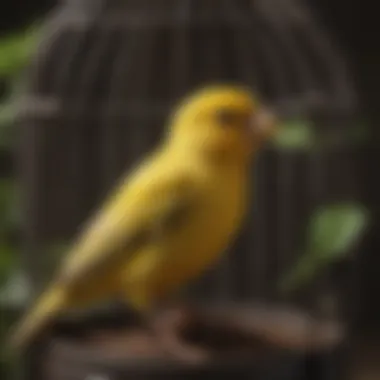
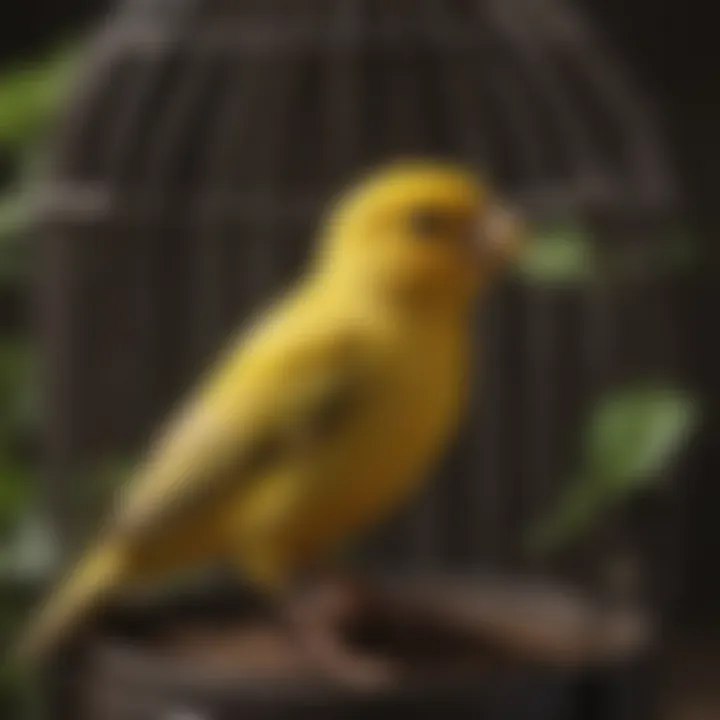
Behavioral Insights on Exotic Birds
Understanding the behaviors of exotic pet birds is crucial for any owner who desires a harmonious relationship with their avian companions. Birds, like all animals, have unique behaviors that stem from their instincts and natural habitats. By gaining insights into these behaviors, new and experienced bird owners can create a nurturing environment that meets their pets' emotional and physical needs. Addressing behavioral aspects goes beyond mere enjoyment; it can enhance the bond between owner and pet, ensuring a fulfilling experience for both.
Understanding Avian Behaviors
Birds communicate primarily through vocalizations and body language. It is key to observe these signals to comprehend their emotions and needs. Each exotic bird species presents its own set of behaviors. For example, Cockatoos are known for their affectionate nature and thrive on social interaction, while Macaws are more playful and vocal.
Some behaviors to consider include:
- Vocalizations: Birds often communicate different feelings such as happiness or boredom through various sounds. Knowledge of these sounds aids in understanding your pet's mood.
- Body Language: Wing flapping, head bobbing, and preening can indicate different states of wellbeing or boredom.
- Foraging Behavior: These birds are naturally inclined to search for food in the wild. Providing toys that mimic foraging activities can significantly reduce destructive behaviors.
Birds can also exhibit stress or anxiety, particularly if their environment lacks stimulation. Therefore, recognizing signs of distress—like excessive feather plucking or changes in eating habits—is essential. Owners can minimize stress through proper environmental enrichment, making the attention placed on understanding avian behaviors worthwhile.
Common Behavior Issues
Despite their beauty and charm, exotic birds can encounter several common behavioral issues that require attention. Being proactive is vital to prevent these problems from escalating.
- Destructive Chewing: Many exotic birds will chew on anything available, including furniture and electrical cords. Providing approved chew toys can redirect this behavior.
- Screaming: Loud vocalizations are a common issue, often arising from boredom or a lack of social interaction. Assessing your bird's social needs and enhancing stimulation can help reduce unnecessary noise.
- Fearful Behavior: Some exotic birds may exhibit fear of new objects or changes in their environment. Gradually introducing new items can help to desensitize them.
- Aggression: This can manifest as biting or lunging, often due to territorial instincts. Understanding breeding behaviors or social hierarchy among birds can assist in managing aggression.
"Understanding a bird's behavioral patterns is foundational for successful pet ownership and can greatly improve the bond between owner and bird."
General awareness and understanding of these behaviors lead to better care practices, fostering both mental well-being and physical health for exotic birds. This ultimately creates a happier home for birds and their owners.
Ethical Considerations in Exotic Bird Ownership
In the realm of exotic pet birds, ethical considerations play a significant role in ensuring the well-being of these creatures and sustainable practices in their acquisition. Understanding these considerations can improve not only the lives of the birds but also the satisfaction and sense of responsibility of their owners. As society grows more aware of animal welfare, it is essential for bird enthusiasts in New York to navigate these complex issues thoughtfully.
Impact on Wild Populations
The capture and trade of exotic birds can greatly affect wild populations. Some species may be taken from their natural habitats, leading to a decline in their numbers. This raises questions about species survival and ecosystem balance. Specific birds like the Spix's Macaw have faced near extinction because of habitat loss and illegal trapping. Thus, when considering a pet bird, potential owners should think deeply about the source of that bird.
Birds captured from the wild often do not adapt well to captivity. They may suffer from stress and health issues, affecting their quality of life and the owner's experience. Supporting responsible retailers and breeders who prioritize breeding in safe environments is vital. This ensures that avian populations remain stable in the wild and prevents unintended ecological damage.
Responsible Breeding Practices
Breeding exotic birds comes with a set of responsibilities. Ethical breeders prioritize the health of the birds and the quality of their breeding programs. Proper breeding practices include genetic diversity to avoid inbreeding, a focus on species' natural behaviors, and providing adequate care throughout their lives.
When choosing to add a bird to one's home, it is important to seek out breeders who adhere to ethical standards. This might include:
- Providing spacious environments for breeding pairs
- Following guidelines for bird care and nutrition
- Avoiding overbreeding to ensure that each bird is given ample attention
In addition to these practices, breeders should also educate potential owners on proper care and behavior. This helps create a better environment for both the owner and the bird. It builds a community that values responsible pet ownership, ensuring that birds are not just seen as possessions but as companions deserving of love and care.
"The true essence of bird ownership lies not just in possession but in a mutual understanding and respect between species."
As bird lovers in New York continue to grow in number, it is crucial to foster a community that emphasizes ethical considerations. By supporting practices that promote sustainability, wildlife conservation, and the welfare of individual birds, owners can create a legacy of compassion and responsibility.
Finding Exotic Birds in New York
Finding exotic birds in New York is a critical aspect of understanding avian companionship. With the diverse landscape of pet ownership in the city, selecting the right source for an exotic bird is essential for both the bird’s health and the owner’s experience. This section emphasizes the significance of sourcing birds from reputable places and considers the socio-economic implications surrounding exotic bird ownership.
Reputable Breeders and Sellers
Choosing to work with reputable breeders and sellers is vital for any potential bird owner. These breeders are known for adhering to high standards of animal care and breeding practices, ensuring that the birds are healthy and well-socialized. By investing time in researching heard it from across the avian community, one can avoid purchasing from sources that might perpetuate harm to the birds or that support unethical practices.
Some tips for finding reputable breeders include:
- Check credentials: Look for breeders who have a solid history and good standing with avian organizations like the American Federation of Aviculture or the Association of Avian Veterinarians.
- Visit facilities: It's essential to tour the breeding facility, if possible. Observe the conditions the birds live in and ask questions about their care and breeding practices.
- Seek references: Talk to previous customers to gauge their satisfaction and their experiences with the breeder.
Sorting through the available sellers is crucial to ensure the best possible match for you and your future bird. By making an informed choice, owners can foster a healthy environment for both human and avian companions.
Adoption Options for Exotic Birds
Adoption offers an alternative route to obtaining an exotic bird. Numerous bird rescue organizations and sanctuaries are available throughout New York, providing a chance for prospective pet owners to welcome birds in need of a home. This choice not only supports the well-being of the birds but also offers the joy of giving a second chance to an animal.
Benefits of considering adoption include:
- Variety of species: Shelters may have a diverse range of birds that are looking for homes, from cockatiels to parrots, allowing adopters to find a suitable pet that matches their preferences.
- Pre-adoption screening: Many organizations perform an evaluation of potential adopters to ensure they meet the needs of the bird, aiming for a good fit and long-term commitment.
- Lower costs: Adoption fees are often significantly lower than purchasing from breeders, making it a more accessible option.
The act of adopting fosters a community-oriented mindset and helps mitigate the issues surrounding breed-specific demands that often contribute to neglect. In New York, reaching out to local bird rescues can therefore be a responsible, fulfilling avenue to explore for those seeking to expand their family with an exotic bird.
Closure
The journey through understanding exotic pet birds in New York offers a glimpse into a vibrant, complex world. This article has explored various facets of bird ownership, from the specific species popular in the city to the legal guidelines and economic responsibilities that accompany such a hobby.
Exotic bird ownership is not merely about companionship; it encompasses ethical implications regarding conservation and the welfare of these animals. Those considering bringing a bird into their home must weigh the beauty of these creatures against the duty of care they require.
The Future of Exotic Bird Ownership in New York
As urban living evolves, so does the approach to pet ownership. The future of exotic bird ownership in New York will likely see a shift in awareness and responsibility. Increased education on proper care, coupled with stricter regulations, may lead to a more knowledgeable community of bird owners. There is potential for greater collaboration between bird enthusiasts and conservation efforts aimed at protecting natural habitats.
The integration of technology might also play a role. Innovations like smart feeding systems and health monitoring apps are emerging. These tools could enhance the care experience for both owners and birds. Furthermore, forums for sharing experiences and advice—such as those found on Reddit and Facebook—are likely to foster a supportive culture for prospective and current bird owners.
Final Thoughts
The enchanting presence of exotic birds in New York can enrich lives. However, this beauty should not overshadow the responsibility it carries. With informed decisions and a commitment to ethical ownership, future generations can enjoy the delight that these birds provide while ensuring their well-being and conservation.















